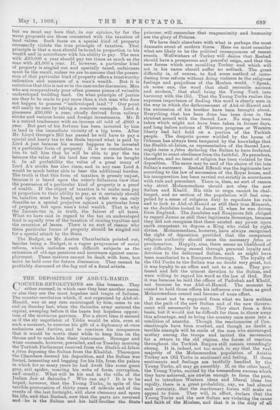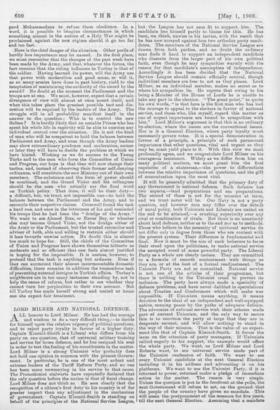THE DEPOSITION OF ABD-17L-HAMID.
COUNTER-REVOL17TIONS are like treason. They either succeed, in which case they bear another name, or else they are the most hopeless and tragic of failures. The counter-revolution which, if not organised by Abd-ul- Hamid, was at any rate encouraged by him, came to an end on Sunday last, when the Salonika army entered the capital, sweeping before it the brave but hopeless opposi- tion of the mutinous garrison. For a short time it seemed as if the sly negotiator of Yildiz would be able, even at such a moment, to exercise his gift of a diplomacy at once audacious and furtive, and to convince his conquerors that it would be worth their while to keep him on the throne and to make him their instrument. Stronger and wiser counsels, however, prevailed, and on Tuesday morning the Turkish Parliament received from the Sheikh-ul-Ishun a fetva deposing the Sultan from the Khalifai Thereupon the Chambers decreed his deposition, and the Sultan was forced, lamenting and begging for his life, from the palace in which for so many years he had dwelt like some great grey, evil spider, weaving his webs of force, corruption, and cruelty. What will be his end in the villa of the Italian Jew at Salonika ? Who can say ? It is to be hoped, however, that the Young Turks,, in spite of the terrible provocation of thirty years of misrule and of the events of the last fortnight, will show clemency and spare his life, and that Reshad, now that the parts are reversed and he is the Sultan and • his half-brother tho State prisoner, will remember that magnanimity and humanity are the glory of Princes.
We have dealt elsewhere with what is perhaps the most dramatic event of modern times. Here we must consider what are likely to be the political consequences of recent events. Wellwishers of Turkey will desire that Reshad should have a prosperous and peaceful reign, and that the new forces which are moulding Turkey and which will act in his name should suffer no setback. The great difficulty is, of course, to find some method of intro- ducing true reform without doing violence to the religious feelings and prejudices of the Moslem world. " Speak, oh some one, the word that shall reconcile ancient and modern," that shall bring the Young Turk into harmony with the Old. That the Young Turks realise the supreme importance of finding this word is clearly seen in the way in which the dethronement of Abd-ul-Hamid and the succession of his brother have been brought about., Everything that has been done has been done in the strictest accord with the Sacred Law. No step has been taken which might not have been taken in former days, and long before notions of Western progress or Western liberty had laid hold on a portion of the Turkish people. The despotic power wielded by the house of 'Othman has always been tempered by the knowledge that the Sheikh-ul-Islam, as representative of the Sacred Law, might issue a fetva declaring the Sultan to have forfeited the right to exact obedience from the faithful. No precedent, therefore, and no tenet of religion has been violated by the deposition. The same may be said of the choice of the late Sultan's successor. Reshad Effendi was the legitimate heir according to the law of succession of the Royal house, and his inauguration has been carried out strictly in accordance with rule and precedent. There is, then, no sort of reason why strict Mohammedans should not obey the new. Sultan and Khalif. His title to reign cannot• be chal- lenged, and no section of the population will feel corn-, polled by a sense of religious duty to repudiate his rule; and to look to Abd-ul-Hatnid as still their true Monarch, as the Jacobites looked to James II. when he was driven. from England. The Jacobites and Nonjurors felt obliged to regard James as still their legitimate Sovereign, because they did not recognise that there existed any power upon earth competent to depose a King who ruled by right, divine. Mohammedans, however, have always recognised the right of deposition provided that the competent, religious authority should issue the necessary fetva or proclamation. Happily, also, there seems no likelihood.of. any difficulty being caused through personal loyalty and devotion to the dethroned Sultan, such as might have been manifested to a European Sovereign. The loyalty of the Old Turks to the Sultan was no doubt very great, but it was loyalty to an office and not to , a man. They, pro-. Leased and felt the utmost devotion to the Sultan, and. were willing to regard his word as the law of God. But it was because be held the offices of Padishah and Khalif, not because he was Abd-ul-Hamid. The moment be ceased to hold those offices his influence over them as good Mohammedans ceased and became of none effect.
It must not be supposed from what we have written. that the path of the new Sultan and of the new Govern- ment will necessarily be easy. They start from a firm basis, but it would not be difficult for them to throw away this advantage, and, to bring the country once more into a condition of anarchy. Though the reactionaries of Con- stantinople have been crushed, and though no doubt a terrible example will be made of the men who encouraged mutiny among the troops and incited the movement for a return to the old regime, the forces of reaction throughout the Turkish Empire still remain exceedingly strong. It is, indeed, not too much to say that the vast majority of the Mohammedan population of Asiatic Turkey are Old Turks in sentiment and feeling. If these sentiments and feelings are tactfully handled by the Young Turks, all may go smoothly. If, on the other hand,' the Young Turks, excited by the tremendous success which they have achieved, are unwise enough to force the pace, and to introduce Western ideas and liberal ideas too rapidly, there is a great probability, nay, we had almost said certainty, that the reactionary forces will make an appeal to force. They will, in effect, declare that the Young Turks and the new Sultan are violating the cause . and faith of the Moslem, and that it is the duty of all good Mohammedans to refuse them obedience. In a -word, it is possible to imagine circumstances in which something almost in the nature of a Holy War might be proclaimed against the new regime should it go too far and too fast.
Here is the chief danger of the situation. Other perils of hardly less importance may be named. In the first place, we must remember that the changes of the past week have been made by the Army, and that, whatever the forms, the fact remains that the ruling influence in Turkey is that of the soldier. Having learned its power, will the Army use that power with moderation and good sense, or will it, as so many armies have done in past history, yield to the temptation of maintaining the authority of the sword by the sword? No doubt at the moment the Parliament and the troops are at one. We must, however, expect that a certain divergence of view will almost at once assert itself, and when this takes place the greatest possible tact and dis- cretion will be required by the leaders of the Army. The struggle will in all probability manifest itself in the answer to the question : Who is to control the new Sultan It is hardly likely that an amiable Prince who has spent his whole life in captivity will be able to exercise any individual control over the situation. He is not the kind of man who will be competent to hold the balance between Parliament and Army, and even though the Army leaders may show extraordinary prudence and moderation, sooner or later they will have to decide the problem at which we have hinted. Wishing as we do success to the Young Turks and to the men who form the Committee of Union and Progress, our hope is that they will now change their tactics, and, instead of observing their former self-denying ordinance, will constitute the new Ministry out of their own members. The substance and the form of power should be combined, and the Grand Vizier and his colleagues should be the men who actually say the final word on Turkish policy. That done, it will be their duty— a difficult, but, we trust, not impossible one—to hold the balance between the Parliament and the Army, and to reconcile their respective claims. Cromwell found the task a hard one, and once in the bitterness of his soul reminded his troops that he had been the "drudge of the Army." We want to see Ahmed Riza, or Enver Bey, or whoever else may become Grand Vizier, not the drudge either of the Army or the Parliament, but the trusted reconciler and adviser of both, able and willing to restrain either should it lean towards unwise action. No doubt this is almost too much to hope for. Still, the chiefs of the Committee of Union and Progress have shown themselves hitherto so moderate and so efficient that one feels almost justified in hoping for the impossible. It is useless, however, to pretend that the task is anything but arduous. Even if they can surmount their almost. insurmountable domestic difficulties, there remains in addition the tremendous task of preventing external intrigue in Turkish affairs. Turkey's neighbours are in too many instances standing by, not to help the cause of reform, but rather to see whether they canaot turn her perplexities to their own account. Not till Turkey has made herself strong and united at home can she expect fair treatment.











































 Previous page
Previous page